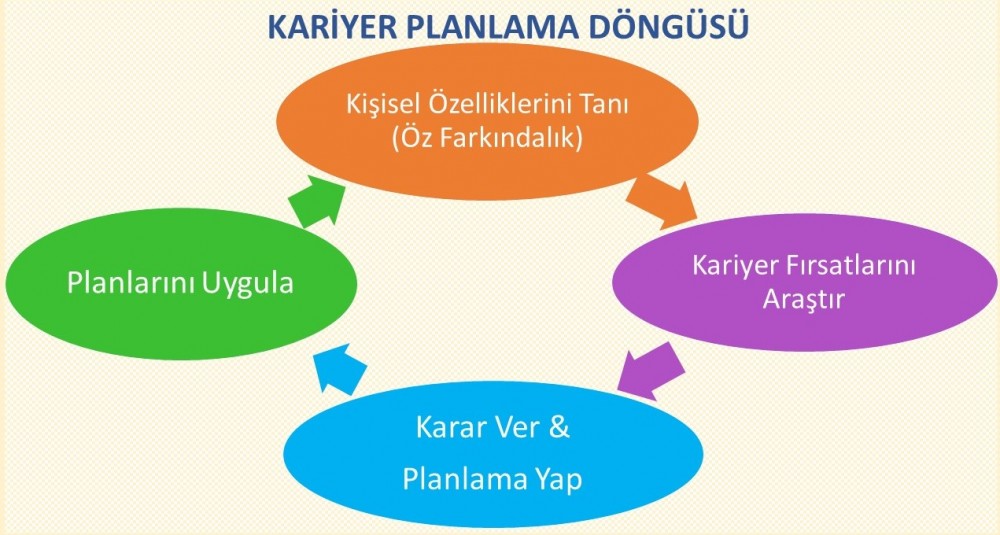
Career Planning Cycle
Career planning is a process in which an individual’s goals, plans, tasks, and positions related to their work are planned throughout their life. This process involves a continuous cycle that continues throughout your working life. The stages that should be taken into account in the individual career planning cycle are as follows:
1) Know Your Personal Traits (Self-Awareness):
When charting your career path, the first thing you should do is analyze your personal traits. Being aware of your values, interests, and personality traits and determining your career path accordingly will lead you to a work life that makes you happy.
Values: Try to identify the values you consider important for yourself. When analyzing yourself, you can separate general values (success, freedom, happiness, equality, self-respect, etc.) from work-related values (high salary, job security, travel, creativity, helping others, working alone or with few people, working in a stressful job, etc.). Finally, determine what results (status, money, respect, power, flexible hours, self-actualization, independence, etc.) you expect from a job that aligns with your identified values.
Interests: It is very important to be aware of what you enjoy doing and which activities you find enjoyable when evaluating yourself. Your interests show you which profession you are more suited for. When discovering your career-related interests, you may consider using widely used inventories (e.g., Holland’s Occupational Interest Inventory).
Personality: The consistent behavioral patterns in the way you relate to yourself and others form your personality traits. The basic personality traits are: extraversion - introversion, agreeableness, conscientiousness, emotional stability, and openness to experience. Your personality traits are another crucial factor in making the right decisions about your career. Certain personality traits are more suited to certain professions and working environments compared to others. You can use widely used personality tests (e.g., Big Five Personality Test, Minnesota Multiphasic Personality Inventory) to evaluate your personality traits.
2) Research Career Opportunities:
After becoming aware of your personal traits, it is necessary to research career opportunities in the business world. It is important to learn about the trends in the profession you want to pursue or are currently studying. Understanding the latest developments in the field you are interested in, current and projected labor market demands, and the necessary education, experience, certifications, etc., required for employment will help move you forward.
3) Make Decisions & Plan:
After analyzing your personality traits and career opportunities in the field you wish to pursue, you should evaluate the resources available to you and set your career goals. At this point, you can ask yourself the following questions:
- Where do I want to be, and where am I now?
- What are my strengths and resources? Can they help me reach my goals?
- What are my weaknesses that prevent me from reaching my goals? How can I improve them?
- What are the external obstacles preventing me from reaching my goal? Who can I get help from to overcome these obstacles?
Based on your answers to the above questions, you should make decisions related to your goals and plan the necessary steps.
4) Implement Your Plan:
At this stage, you are expected to take action based on the information you gathered in the previous stages. Using your knowledge about yourself, the work environment you want to be a part of, and your goals, you should take the necessary steps. For example, you can acquire the necessary skills by taking courses and certifications. You may pursue a master’s degree, prepare effective cover letters and resumes, and participate in job interviews. By networking with people in your career field, you can build a strong career network.
Finally, you can repeat the career planning process based on changes in certain situations. In the future, changes in your values or working conditions may restart your career planning process.

